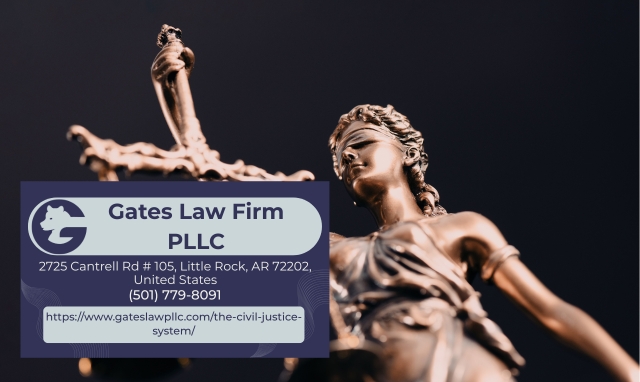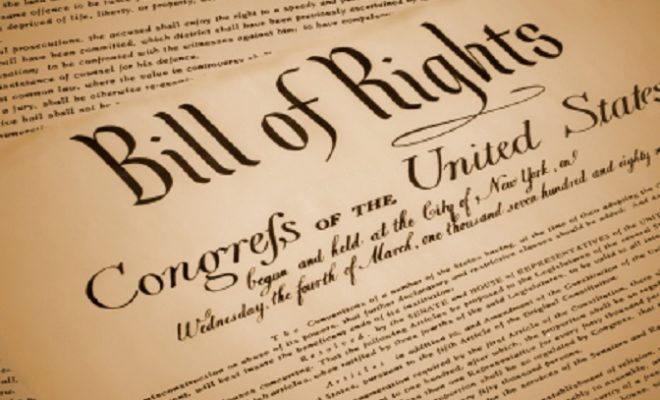The Arkansas civil justice system serves as a structured process for resolving disputes between individuals, businesses, and other entities, particularly when harm or injury has occurred. Unlike criminal cases, which focus on penalizing wrongdoing, civil cases aim to address the impact of negligence or misconduct and provide fair compensation to the injured party. For those dealing with personal injury cases in Arkansas, this system is a vital mechanism for holding responsible parties accountable and pursuing justice.
At Gates Law Firm, PLLC, our top-rated Arkansas personal injury attorney recognizes that personal injury cases involve more than just legal procedures. They often represent a critical moment in someone’s life. From filing the initial claim to gathering evidence, negotiating settlements, or advocating in court, every stage of the process is an opportunity to protect the rights of injured individuals and seek the compensation they deserve.
If you’ve been injured due to someone else’s carelessness, Gates Law Firm, PLLC is here to guide you through every phase of your case. We’re ready to stand by your side throughout the legal process, protecting your rights and pursuing the compensation you need.
Contact us today at (501) 779-8091 to schedule a consultation and take the first step toward justice and recovery.
How Does the Civil Justice System Work?
In Arkansas, the civil justice system provides a structured process for individuals to resolve disputes through legal means. This system is grounded in constitutional principles and is designed to adjudicate cases where one party seeks remedy from another for non-criminal matters, such as personal injury claims.
Adversarial Process and Roles
The civil justice system operates on an adversarial model, where each party presents their case to an impartial judge or jury. The individual initiating the lawsuit is the plaintiff, and the opposing party is the defendant. Both sides have the opportunity to present evidence, call witnesses, and make legal arguments to support their positions.
Burden of Proof
In Arkansas civil cases, the burden of proof rests with the plaintiff, who must establish their claims by a “preponderance of the evidence.” This standard requires the plaintiff to demonstrate that their assertions are more likely true than not, meaning there is greater than a 50% chance that the claims are valid. This is a lower threshold compared to criminal cases, which require proof “beyond a reasonable doubt.” The rationale for this lower standard in civil cases is to facilitate access to justice for individuals seeking redress for grievances without the stringent requirements of criminal proceedings.
Elements of a Personal Injury Case
In personal injury lawsuits within Arkansas, the plaintiff must prove three key elements:
- Liability: The defendant had a duty of care and breached that duty.
- Damages: The plaintiff suffered actual harm or losses as a result.
- Causation: The defendant’s actions directly caused the damages.
Failure to prove all three elements by a preponderance of the evidence will result in the dismissal of the case. The defendant is not required to disprove the plaintiff’s claims but can prevail if the plaintiff fails to meet the burden of proof.
If the plaintiff successfully proves their case, the court should award remedies, typically in the form of monetary compensation for damages incurred. These damages can cover mental anguish, pain and suffering, medical expenses, lost wages, and other related costs. In some cases, the court may also issue orders requiring the defendant to take specific actions or refrain from certain conduct.
Through this framework, the Arkansas civil justice system aims to provide a fair and accessible means for individuals to seek justice and resolve disputes.

How are Civil and Criminal Cases Different?
Civil and criminal cases differ significantly in purpose, process, and outcomes, reflecting their distinct roles within Arkansas’s legal system. Civil cases are initiated by individuals or entities seeking remedies for personal grievances, such as compensation for injuries or damages caused by another party’s negligence. In contrast, criminal cases are brought by the State to address offenses considered harmful to society, such as theft or assault.
As previously mentioned, the burden of proof also sets these cases apart. In civil cases, the plaintiff must demonstrate their claim by a preponderance of the evidence, meaning it is more likely than not that the defendant is liable. Criminal cases, however, require the prosecution to prove the defendant’s guilt beyond a reasonable doubt, a significantly higher standard due to the potential for severe penalties, such as imprisonment.
The outcomes of these cases further highlight their differences. Civil cases often result in monetary compensation or orders for specific performance, while criminal cases can lead to fines, incarceration, or probation. Together, these distinctions emphasize the dual roles of civil and criminal law in addressing private disputes and maintaining societal order.
Further, civil cases can be brought against the corporation or entity who allowed the harm to take place. The State typically does not prosecute corporate wrongdoers for their bad acts that hurt other people; thus, the civil justice system is the ONLY means to hold corporations or entities accountable.

Is the Civil Justice System Fair?
The civil justice system in Arkansas is designed to provide a structured and impartial forum for resolving disputes between individuals and entities. While no system is without imperfections, the civil justice framework offers a balanced approach that emphasizes accountability, restitution, and the peaceful resolution of conflicts.
Historical Context of Dispute Resolution
Throughout history, societies have employed various methods to address grievances:
- Retributive Measures: Practices like “an eye for an eye” aimed for direct retribution but often perpetuated cycles of retaliation without fostering reconciliation.
- Vigilante Actions: Individuals taking the law into their own hands lacked standardized procedures, leading to inconsistent and often unjust outcomes.
- Criminal Prosecution: The criminal justice system addresses offenses against the State but may not provide remedies for victims in cases lacking criminal intent.
- Regulatory Oversight: Government regulations can prevent certain harms but may not offer individualized remedies for specific grievances.
The civil justice system allows for a nuanced approach where parties can seek compensation or specific remedies for harms suffered, promoting resolution without resorting to punitive measures.
Principles Upholding Fairness
Several foundational principles contribute to the fairness of the civil justice system:
- Burden of Proof: In civil cases, the plaintiff must establish their claims by a “preponderance of the evidence,” meaning it is more likely than not that the claim is true. This standard balances the need for proof with accessibility to justice.
- Adversarial Process: Both parties have the opportunity to present evidence, call witnesses, and make legal arguments, ensuring that each side’s perspective is considered.
- Impartial Adjudication: Judges and, in many cases, juries serve as neutral decision-makers, evaluating the evidence and rendering decisions based on the law and facts presented.
The system provides for remedies such as monetary compensation or injunctions, aiming to restore the injured party to the position they were in before the harm occurred.

Common Types of Civil Cases in Arkansas
In Arkansas, civil cases cover a wide range of disputes where individuals or entities seek legal remedies for harm or breaches of duty. Some of the most common types of civil cases in Arkansas include:
- Personal Injury Cases: Involving claims for compensation after injuries caused by negligence, such as car accidents, slip-and-fall incidents, or medical malpractice.
- Contract Disputes: Arising when one party fails to fulfill the terms of a legally binding agreement.
- Property Disputes: Addressing conflicts over ownership, boundaries, or damage to property.
- Family Law Matters: Including divorce, child custody, and spousal support cases.
- Small Claims Cases: Focusing on disputes involving smaller monetary amounts, typically handled in a simplified court process.
These cases are adjudicated in civil courts, where judges or juries assess the evidence presented to determine liability and appropriate remedies.
For individuals pursuing personal injury claims in Arkansas, it’s important to be aware of the state’s statute of limitations. Generally, a lawsuit must be filed within three years from the date of the injury. Failing to file within this timeframe may result in the loss of the right to seek compensation.
| Type of Case | Description | Examples |
|---|---|---|
| Personal Injury | Claims for injuries caused by negligence. | Car accidents, slip-and-fall, malpractice |
| Contract Disputes | Issues when one party fails to honor an agreement. | Broken service contracts, unpaid bills |
| Property Disputes | Conflicts over ownership, damage, or boundaries. | Fence issues, land encroachments |
| Family Law | Legal matters involving domestic relationships. | Divorce, custody, spousal support |
| Small Claims | Minor disputes over limited dollar amounts. | Unpaid rent, damaged goods |
The Hierarchy of Arkansas Courts
Arkansas’s court system is structured to handle a wide range of legal matters, from minor disputes to significant civil cases. This hierarchy ensures that cases are addressed at the appropriate level, providing an organized approach to justice.
District Courts: Handling Minor Civil Matters
District Courts in Arkansas serve as courts of limited jurisdiction, addressing less complex civil cases. These courts are often the first point of contact for individuals seeking legal remedies for smaller disputes.
- Jurisdiction: Civil cases involving contracts, damage to personal property, and recovery of personal property where the amount in controversy does not exceed $25,000.
- Small Claims Division: Handles cases where the amount in controversy does not exceed $5,000, providing a simplified process for self-represented litigants.
District Courts are accessible venues for resolving disputes without the complexities of higher courts, making them suitable for straightforward civil matters.
Circuit Courts: The Primary Trial Courts
Circuit Courts are the main trial courts in Arkansas, possessing general jurisdiction over a broad spectrum of civil and criminal cases. They are organized into 28 judicial circuits, each serving specific counties.
- Divisions: Each circuit court comprises five divisions: civil, criminal, probate, domestic relations, and juvenile.
- Civil Jurisdiction: Handles all cases not assigned to other courts, including personal injury lawsuits, contract disputes, and property matters.
Circuit Courts are equipped to manage complex civil litigation, offering a formal setting for the adjudication of significant legal disputes.
Appellate Courts: Reviewing Lower Court Decisions
Arkansas’s appellate courts review decisions made by lower courts to ensure the correct application of law and legal procedures. There are two levels of appellate courts: the Arkansas Court of Appeals and the Arkansas Supreme Court.
- Arkansas Court of Appeals: Serves as the intermediate appellate court, reviewing cases assigned by the Supreme Court. It comprises 12 judges elected to eight-year terms.
- Arkansas Supreme Court: The highest court in the state, consisting of seven justices elected to eight-year terms. It has discretionary authority to review decisions from the Court of Appeals and handles cases involving constitutional issues and significant legal questions.
Appellate courts play a crucial role in maintaining consistency and fairness in the legal system by overseeing and correcting errors from lower court proceedings.
How to Determine Legal Standing for a Civil Case
Legal standing refers to the plaintiff’s ability to demonstrate a sufficient connection to the harm caused, which is essential for bringing a lawsuit. In Arkansas, establishing standing involves several key considerations:
- Injury in Fact: The plaintiff must have suffered a concrete and particularized injury, which can be physical, financial, or emotional.
- Causation: There must be a direct link between the injury and the defendant’s actions or omissions.
- Redressability: The court must be able to provide a remedy that addresses the injury.
In personal injury cases, such as those arising from automobile accidents or slip-and-fall incidents, demonstrating these elements is fundamental to proceeding with a lawsuit.
Deadlines and Statutes of Limitations in Arkansas
Adhering to statutory deadlines is critical in civil litigation:
- Personal Injury Claims: Generally, a lawsuit must be filed within three years from the date of injury.
- Medical Malpractice: Claims must be filed within two years from the date of the alleged malpractice. This may not be the same date as when the injury is discovered.
- Wrongful Death: Actions must be initiated within three years from the date of death.
Missing these deadlines typically results in the loss of the right to pursue legal action. Therefore, it’s imperative to be aware of and comply with these time constraints when considering a lawsuit.
The Pre-Trial Process
Before a civil case reaches trial in Arkansas, both parties engage in several important steps that allow them to prepare their arguments and examine each other’s positions. This pre-trial phase helps define the issues and determine how the case might proceed in court. In personal injury cases, this stage often determines the strength of evidence and may influence the outcome of settlement discussions.
What Is Discovery, and Why Is It Important?
Discovery refers to the formal exchange of information between the plaintiff and the defendant. This process allows both sides to uncover facts, evaluate claims, and prepare legal strategies. In Arkansas, discovery is governed by the Arkansas Rules of Civil Procedure and typically includes written questions, document requests, and depositions.
Discovery helps determine the cause of injury, the extent of damages, and the link between the defendant’s actions and the plaintiff’s harm. It also provides insight into insurance coverage, prior accidents, and relevant medical history.
Depositions, Interrogatories, and Requests for Production of Documents: Gathering Evidence
Depositions, interrogatories, and requests for production of documents are three of the most frequently used discovery tools in Arkansas personal injury litigation.
Interrogatories are written questions that one party sends to the other. The recipient must respond in writing and under oath. These questions may cover topics such as how the injury occurred, medical treatment, or employment history.
Requests for production of documents are designed for the opposing party to share documents that are relevant to the civil case. Typical requests include policies, procedures, incident reports, and statements made.
Depositions are oral testimony taken under oath, typically recorded in person. During Covid, attorneys became more comfortable with conducting depositions by Zoom, and this practice has continued in the years since. Attorneys from both sides may question the witness, and a court reporter records the exchange. Depositions can be used to question the plaintiff, defendant, eyewitnesses, or medical professionals.
All three tools help attorneys assess credibility, gather details, and prepare for trial or settlement negotiations. Inconsistencies or admissions in a deposition can significantly affect how the court views the case.
Founding attorney Joseph Gates frequently lectures on depositions through AAJ’s Deposition College.
Motions and Hearings That Shape the Case
Motions and pre-trial hearings allow the court to address legal issues before trial. These steps may influence the direction or scope of the case and are common in Arkansas civil courts.
- Motion to Dismiss: Requests the court to end the case based on legal insufficiency, such as lack of jurisdiction or failure to state a claim.
- Motion for Summary Judgment: Argues that there are no material facts in dispute and asks the court to rule in favor of one party without a trial.
- Motion to Compel: Used when one party fails to respond to discovery requests, asking the court to require compliance.
Pre-trial hearings may also be held to resolve evidentiary disputes, schedule deadlines, or address procedural matters. These hearings can narrow the issues for trial or lead to early resolution of some claims.
Trials vs. Settlements: What You Need to Know
Civil disputes, including personal injury claims, can be resolved through various avenues such as settlements, trials, mediation, and arbitration. Each method offers distinct procedures and outcomes, allowing parties to choose the most appropriate path based on their specific circumstances.
Many personal injury cases are resolved through settlements before reaching trial. Settlements involve negotiated agreements where the defendant agrees to compensate the plaintiff without admitting fault. This approach often saves time and legal expenses.
However, if a fair settlement cannot be achieved, proceeding to trial becomes necessary. At trial, both parties present evidence, and a judge or jury determines the outcome. While trials can potentially result in higher compensation, they also involve more time, costs, and uncertainty.
The Trial Process: Jury Selection to Final Verdict
When a personal injury case proceeds to trial in Arkansas, it follows a structured process:
- Jury Selection (Voir Dire): Potential jurors are questioned to assess their suitability for the case. Attorneys may challenge certain jurors to ensure an impartial jury is selected.
- Opening Statements: Both sides present an overview of their case to the jury, outlining the evidence and arguments they intend to present.
- Presentation of Evidence: The plaintiff presents evidence and witnesses to support their claim, followed by the defendant’s presentation of their defense.
- Closing Arguments: Each side summarizes their case, highlighting key evidence and attempting to persuade the jury in their favor.
- Jury Instructions and Deliberation: The judge provides legal guidelines to the jury, who then deliberate in private to reach a verdict.
- Verdict: The jury announces its decision, determining liability and, if applicable, the amount of damages to be awarded.
This process is designed to ensure a fair and impartial resolution based on the evidence and legal standards.
Alternative Dispute Resolution Options
In Arkansas, individuals involved in personal injury disputes have avenues outside the traditional courtroom to resolve their cases. Alternative Dispute Resolution (ADR) methods, such as mediation and arbitration, offer structured yet flexible processes that can lead to efficient and mutually agreeable outcomes.
Mediation: Facilitated Negotiation
Mediation is a process where a neutral third party helps disputing parties work toward a voluntary agreement. The mediator facilitates communication by encouraging both sides to understand each other’s perspectives and explore potential solutions. This process is entirely voluntary, with both parties agreeing to participate and maintaining control over the outcome.
Mediation is also confidential, allowing for private discussions that encourage open and honest dialogue. Additionally, it offers flexible scheduling, with sessions arranged at times that are convenient for everyone involved. Mediators are certified through the Arkansas Alternative Dispute Resolution Commission, which ensures they meet specific training and ethical standards.
Arbitration: Binding Decision by a Neutral Party
Arbitration is a formal alternative dispute resolution process in which a neutral arbitrator listens to evidence and arguments from both parties before rendering a decision. This decision can either be binding or non-binding, depending on the terms agreed upon by the parties. The proceedings are structured, resembling a court trial but with less formality and a more streamlined approach.
When the decision is binding, the parties agree in advance to accept it as final, with limited rights to appeal or challenge the outcome. The process is governed by the Uniform Arbitration Act, which establishes the procedures and enforceability of arbitration agreements and awards.
Benefits of ADR in Civil Disputes
Choosing ADR methods like mediation and arbitration can offer several advantages in resolving personal injury disputes:
- Cost-Effective: ADR often incurs lower expenses compared to traditional litigation.
- Time-Saving: Resolutions can be achieved more quickly, avoiding prolonged court proceedings.
- Preservation of Relationships: The collaborative nature of ADR can help maintain professional or personal relationships.
- Customized Solutions: Parties have the opportunity to craft agreements tailored to their specific needs and interests.
The judiciary supports the use of ADR to alleviate court caseloads and provide parties with alternative avenues for dispute resolution. Engaging in ADR can be a strategic choice for individuals seeking a more private, expedient, and collaborative approach to resolving personal injury disputes.
Why Does the Plaintiff Win Money Damages in the Civil Justice System?
In Arkansas personal injury cases, monetary damages serve to compensate the injured party for losses incurred due to another’s negligence. Types of damages include:
- Economic Damages: Cover quantifiable losses like medical expenses and lost wages.
- Non-Economic Damages: Address intangible losses such as mental anguish and pain and suffering.
- Punitive Damages: Imposed to punish egregious conduct and deter similar actions.
Arkansas law allows for these damages to restore the plaintiff’s position as closely as possible to their state before the injury.
Post-Trial Steps
After a personal injury trial concludes in Arkansas, several post-trial procedures may follow. These steps address appeals, judgment enforcement, potential modifications, and the rationale behind monetary awards.
How Appeals Work in Arkansas Civil Cases
In Arkansas, a party dissatisfied with a trial court’s decision can seek appellate review. The process involves:
- Notice of Appeal: Must be filed within 30 days of the final judgment.
- Appellate Review: Conducted by the Arkansas Court of Appeals or the Arkansas Supreme Court, focusing on legal errors rather than factual disputes.
The appellant submits a brief outlining alleged mistakes made by the trial court, while the appellee files a response. The appellate court then decides to affirm, reverse, or remand the case.
Enforcement of Judgments: Collection and Compliance
After a judgment is finalized, the prevailing party might need to take steps to enforce it in order to collect the awarded damages. Enforcement mechanisms can include a writ of execution, which allows the seizure and sale of the debtor’s property, and garnishment, which permits the collection of funds from the debtor’s wages or bank accounts. According to Arkansas Code § 16-56-114, a judgment remains enforceable for ten years, with the possibility of an extension under specific conditions.
How a Personal Injury Attorney Factors Into The Civil Justice System
A skilled Arkansas personal injury attorney plays a key role within the civil justice system by guiding injured individuals through each step of the legal process. From the initial evaluation of a claim to preparing legal documents and presenting evidence, the attorney’s involvement supports the court’s goal of resolving disputes efficiently and fairly. Their ability to interpret state rules, adhere to procedural deadlines, and advocate effectively in negotiations or at trial contributes to the integrity of the system.
Attorneys also help balance the playing field, particularly when claimants face large insurance companies or well-resourced defendants. Their participation not only promotes access to justice but also reinforces the system’s commitment to fair compensation for those harmed due to another’s negligence.
Protecting Your Rights and Pursuing Justice in Arkansas
The civil justice system in Arkansas provides a crucial pathway for personal injury victims to seek accountability and fair compensation after suffering harm due to negligence. Each stage of the process, from filing a claim to presenting evidence and resolving disputes, plays a critical role in achieving a just outcome. However, pursuing a personal injury case requires attention to legal procedures, deadlines, and strategies to safeguard your rights and maximize the compensation you deserve.
At Gates Law Firm, PLLC, we can guide you through this process with care and determination. Our team works closely with injured individuals to handle every aspect of their case, allowing them to focus on recovery while we advocate for their rights. From initial consultations to courtroom representation, we are here to provide the legal support you need.
If you or someone you care about has been injured due to another party’s negligence, now is the time to take action.
Contact Gates Law Firm, PLLC today at (501) 779-8091 to discuss your case, explore your options, and take the first step toward justice and fair compensation. Let us help you move forward with confidence.




